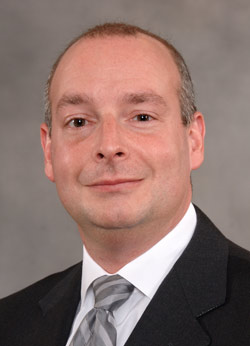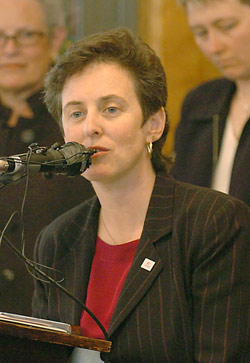Appeals court has stayed Walker’s ruling, but the case has been fasttracked as appeals over standing, merits work through the system
DAVID TAFFET | Staff Writer taffet@dallasvoice.com
The three-judge panel of the 9th Circuit Court of Appeals in California that stayed the lower court’s decision this week ordered the Proposition 8 supporters to defend their standing in the case as it moves up on appeal.
Attorneys following the case closely all called the stay disappointing but were encouraged by the court questioning the standing of the defendants and the fast track timetable.
Chris Stoll is senior staff attorney for National Center for Lesbian Rights, a San Francisco-based organization that filed a brief in the Prop 8 case. He said that although it was disappointed that same-sex couples could not start getting married immediately, he was encouraged that the court fast-tracked the hearing to December and asked both sides to address standing.
Jennifer Pizer, National Marriage Project director for Lambda Legal, said she, too, was not surprised by the stay.
“It’s common for judges to maintain a status quo,” Pizer said.
She said that the stay does not indicate the merits of the case.
In fact, it is quite the opposite, she said, as indicated by the court directing the defendants to justify their standing in the case.
Ken Upton, senior staff attorney for Lambda Legal’s South Central Regional office in Dallas, said that the stay “probably isn’t going to matter much” in the long run because the court put the case “on a really short docket.”
Upton said he liked the schedule.
The court will hear the case after the election, but before a new governor takes office in California.
A different governor could decide to defend the case, Upton noted.
Federal District Judge Vaughn Walker ruled last week that there was no basis to continue a stay of his Aug. 4 ruling declaring Prop 8 unconstitutional. But he declined to lift his stay early, instead saying that it would expire Aug. 15 at 5 p.m., as he had originally ordered.
That gave the 9th Circuit court time to consider issuing a its own stay.
Gov. Arnold Schwarzenegger and Attorney General Jerry Brown had agreed to abide by the lower court’s ruling and said the case should not be appealed.
Since the state was the defendant in the case, the standing of the interveners, the Yes on 8 group that had campaigned for the amendment’s passage and that actually defended the case in court, is now in question.
Stoll explained that in a normal schedule for the 9th Circuit, final briefs might have been filed in December with oral arguments heard in February or later.
With extensions, the case might not have come before the appellate court until well into the spring.
While many cases are decided within weeks, the court is on no deadline. In a more complicated case like this, the decision could take months, Stoll said.
Two cases involving standing will be heard as well as the appeal of the actual ruling.
Officials with Imperial County in southeastern California have filed to defend Proposition 8 on behalf of the state.
And the Yes on 8 group, also known as the interveners, who defended the lower court case are appealing the judge’s decision. But their standing is also being questioned.
Stoll said that traditionally conservatives in the higher courts take a narrower view of standing than liberals.
“In general, they don’t want to be giving opinions that would be advisory and don’t have an impact on real people,” he said. “If the state is willing to abide by the trial court’s opinion, should the courts hear the case?”
When the court rules, presumably it will address standing first. If they find that the interveners and Imperial County officials do not have standing, Stoll said he didn’t expect any further discussion of the case by the court.
If they rule that either of the interveners have standing, then they will rule on the constitutional question.
To show that they have standing to appeal, the interveners “need to show they’ve been harmed to make a federal case out of it,” Pizer said.
“When a law is challenged as being unconstitutional, they can’t just stand up and say, ‘But we really, really want it.’ That works on Fox TV, but not in court.”
However, if the appeals court rules the interveners do not have standing, they can appeal to the U.S. Supreme Court. If that court finds that they do have standing, the case would return to the Circuit Court for a ruling on the legal issues.
If the appellate court finds that the interveners do have standing, then that court will rule on the merits of the case, deciding whether Judge Walker’s interpretation of law was correct and if Proposition 8 is illegal under California’s constitution.
When the three-judge panel that will hear the case makes that decision, either side can petition for the case to be heard “en banc,” which means by the full court. But in the 9th Circuit court, it means a panel of 11 judges chosen randomly from among the 29 on the court.
The ruling by the 11-member panel could then be appealed to the U.S. Supreme Court.
Pizer sees the expedited hearing schedule and the court’s decision to issue the stay as a compromise made by the court.
“The stay keeps things simpler,” she said.
Pizer said that until the hearing, both sides would be writing briefs. The defense will be arguing that they have standing in the case and that in his decision Judge Walker misread the law.
Ted Olson and David Boies, the two high-profile attorneys representing the plaintiffs in the case, will argue that the interveners have no standing since they are not the ones issuing marriage licenses. Their briefs will argue that the defendants presented no credible witnesses or evidence and the only ones harmed by Proposition 8 are same-sex couples waiting to get married.
Pizer said that the LGBT community should use this time wisely until the case is heard.
“We need to be educating our neighbors about why Judge Walker is correct,” she said.
This article appeared in the Dallas Voice print edition August 20, 2010.


















“…if Proposition 8 is illegal under California’s constitution.”
Please check your facts. This lawsuit is to determine whether Proposition 8 is unconstitutional under the U.S. Constitution, not the California Constitution. When Proposition 8 was passed, it became PART of the California Constitution, therefore by definition it was “constitutional” under the California Constitution.